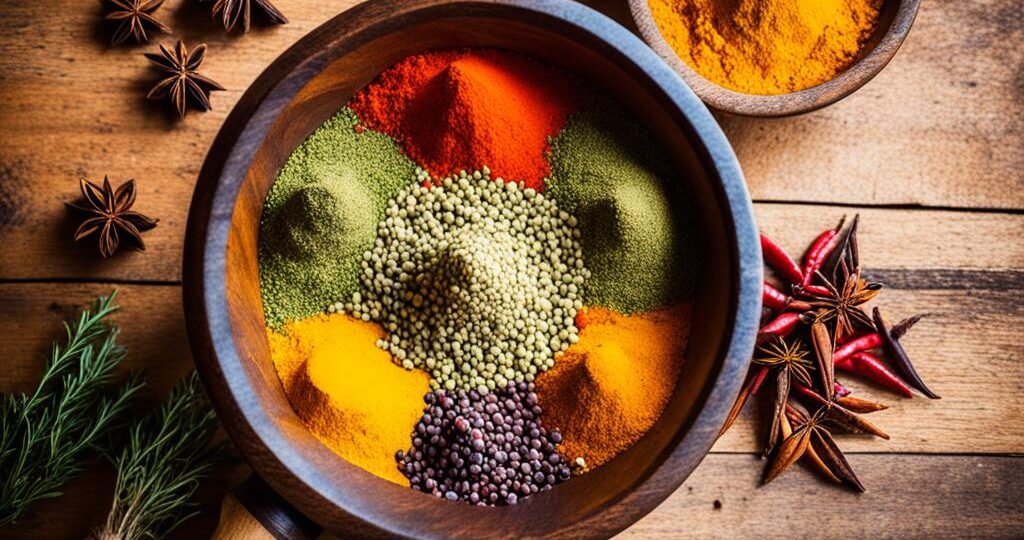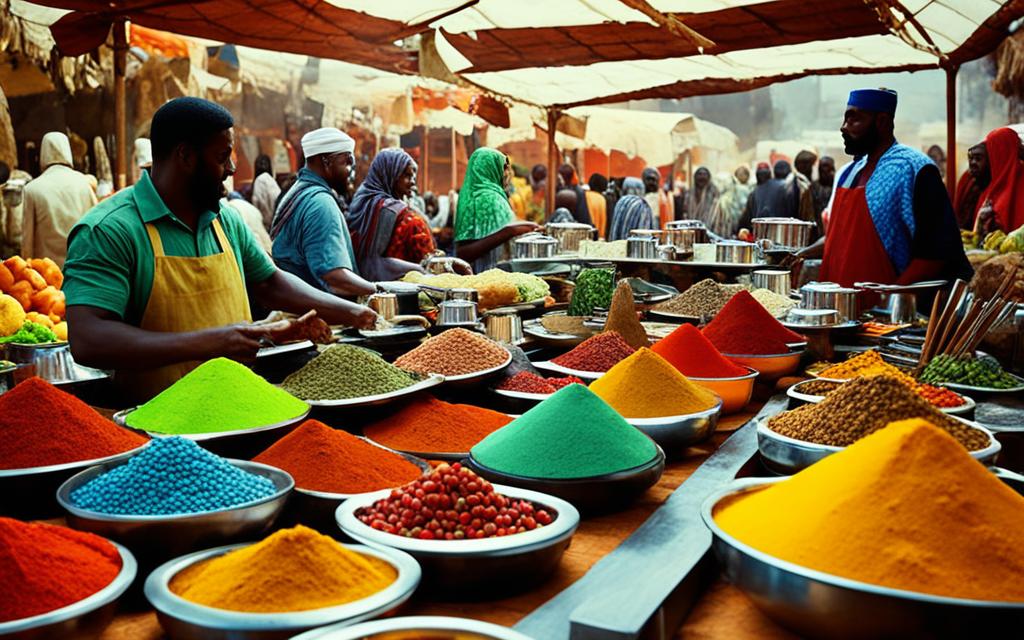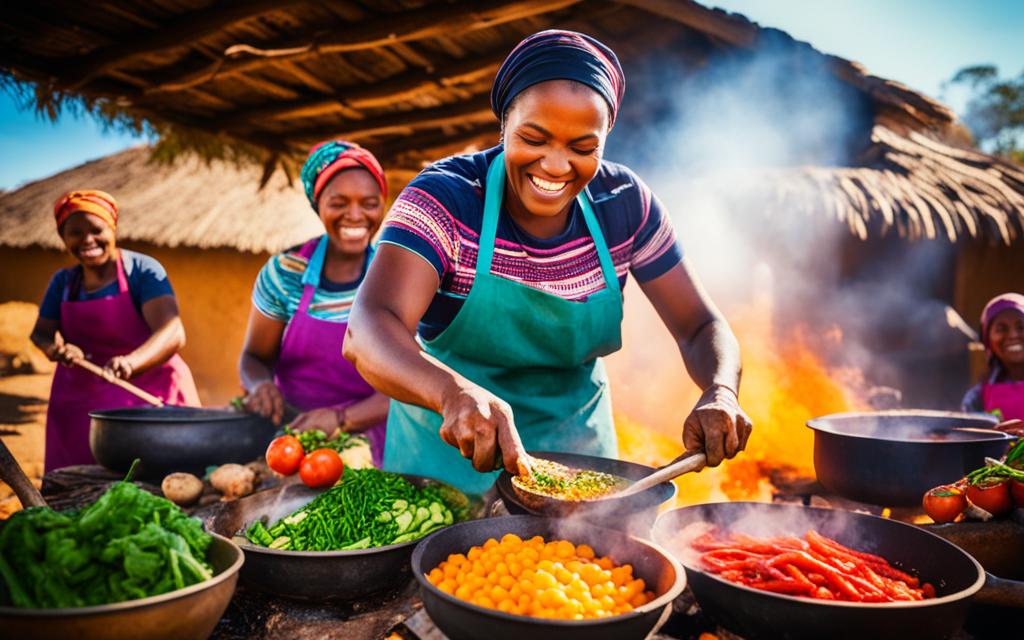African Gastronomy: Culinary Riches Across Regions
March 5, 2024 | by mediaforafrica.net

Have you ever wondered what lies behind the rich flavors and tantalizing aromas of African cuisine? From the spice-infused dishes of West Africa to the intricate flavors of North African tagines, Africa’s culinary traditions have fascinated food enthusiasts for centuries. But how much do we really know about the diverse gastronomic landscape of the continent?
Join us on a culinary journey as we explore the vast world of African gastronomy, delving into the unique culinary traditions that exist across different regions of Africa. From the vibrant spices and cooking techniques to the traditional dishes and recipes passed down through generations, African cuisine offers a treasure trove of culinary delights waiting to be discovered.
Key Takeaways:
- African cuisine is a diverse and vibrant culinary landscape, with each region offering its own unique flavors and cooking techniques.
- From West African jollof rice to North African tagines, traditional dishes play a significant role in African gastronomy.
- Spices and herbs are an integral part of African cuisine, adding depth and complexity to the flavors.
- By exploring African gastronomy, we gain a deeper understanding and appreciation for the rich culinary heritage of the continent.
- Embarking on a gastronomic journey through African cuisine allows us to discover new flavors and challenge our preconceived notions of the continent’s food.
Exploring African Culinary Traditions
In this section, we will take a deep dive into the culinary traditions of African cuisine, focusing on the specific regional foods that make it so rich and diverse. From West Africa to North Africa, East Africa to Southern Africa, each region boasts unique cooking techniques, distinct flavors, and traditional dishes that reflect the cultural tapestry of the continent.
Regional Food
One of the defining features of African cuisine is its strong regional identities. Each region has its own specialty ingredients and cooking methods that contribute to the distinctive flavors of the dishes. For example, in West Africa, staples like yams, plantains, and cassava are commonly used, giving dishes a hearty and earthy taste. In North Africa, fragrant spices such as cumin, coriander, and cinnamon are prevalent in dishes like tagines and couscous.
A true taste of Africa can be found in East African cuisine, where dishes are influenced by Indian, Middle Eastern, and Swahili flavors. Spicy stews, aromatic rice dishes, and flavorful flatbreads are among the popular dishes in this region. Southern Africa is known for its love of meat, with braai (barbecue) being a popular tradition. Grilled meats, stews, and maize-based porridges are enjoyed here, creating a unique culinary experience.
African Recipes
To fully appreciate the depth and diversity of African cuisine, it’s important to explore traditional recipes from different regions. These recipes are a glimpse into the cultural heritage and history of the African people. From the rich and spicy West African peanut stew to the savory and aromatic North African chicken tagine, there is a recipe to suit every palate.
To inspire your culinary adventures, here’s a selection of classic African recipes:
- West African Jollof Rice
- South African Bobotie
- North African Shakshuka
Cooking Techniques
African cooking techniques are as diverse as the continent itself. Traditional methods such as stewing, braising, and grilling are common across different regions, but each has its own unique twist. In West Africa, the use of palm oil and slow cooking methods imparts a rich and deep flavor, while in East Africa, the technique of using a banana leaf to wrap and steam food adds a distinct taste.
Interestingly, African cuisine also includes fermentation as a key technique. Fermented foods like injera in Ethiopia and piri-piri in Mozambique not only enhance flavors but also contribute to the preservation of ingredients in a region where refrigeration might not be readily available.
Traditional Dishes
Traditional African dishes are the heart and soul of the continent’s cuisine. These dishes often represent cultural celebrations, family gatherings, or special occasions. They are steeped in history and tradition, passing down recipes from one generation to another. Some popular traditional dishes include:
- Nigerian Egusi Soup
- Ghanaian Banku with Tilapia
- Kenyan Ugali with Sukuma Wiki
- South African Bunny Chow
“African cuisine is a reflection of the rich cultural heritage and diverse flavors found across the continent. Each dish tells a story, embodies traditions, and brings communities together. From the vibrant markets of Marrakech to the bustling streets of Lagos, the flavors of Africa are a joy for the senses.” – Chef Nompumelelo Mqwebu
The Culinary Diversity of African Cuisine
In the next section, we will explore the incredible culinary diversity that exists within African cuisine. From the spices of Ethiopia to the stews of Southern Africa, get ready to discover the richness and depth of flavors that make African gastronomy truly unique.
The Culinary Diversity of African Cuisine
In this section, we will highlight the incredible culinary diversity that exists within African cuisine. From the vibrant spices of Ethiopian cuisine to the rich stews of Southern Africa, African gastronomy offers a wide array of flavors, ingredients, and cooking styles. Prepare for a gastronomic exploration that will awaken your taste buds and introduce you to the richness and depth of African cuisine.
Flavors that Tell a Story
African gastronomy is a tapestry of flavors that tells the story of the continent’s rich cultural heritage. Each region boasts its own distinct culinary traditions, influenced by local ingredients and historical influences. From the aromatic spices used in Moroccan tagines to the fiery heat of West African jollof rice, the flavors of African cuisine are as diverse as the landscapes they originate from.
An Abundance of Ingredients
One of the defining characteristics of African gastronomy is the abundance of fresh and locally-sourced ingredients. From the tropical fruits and vegetables found in coastal regions to the hearty grains and legumes of the savannahs, African cuisine celebrates the natural bounty of the continent. The use of indigenous ingredients not only adds depth and complexity to dishes but also showcases the resourcefulness and ingenuity of African chefs and home cooks.

A Mix of Cooking Techniques
In addition to the array of flavors and ingredients, African cuisine encompasses a variety of cooking techniques. From slow-cooking in clay pots to grilling over open flames, each method infuses dishes with unique flavors and textures. It is through these traditional cooking techniques that the essence and character of African gastronomy truly shine.
“The culinary diversity of African cuisine is a testament to the continent’s rich history, cultural diversity, and culinary evolution. It is an invitation to embark on a gastronomic journey that will awaken your senses and leave you craving more.” – Chef Kwame Onwuachi
So, join us as we embark on a gastronomic exploration of African cuisine, where culinary diversity meets a rich tapestry of flavors. Get ready to be captivated by the bold and vibrant dishes that showcase the true essence of African gastronomy.
Conclusion
In conclusion, African gastronomy is a treasure trove of culinary traditions waiting to be explored. The flavors of Africa offer a diverse and captivating experience that takes us on a culinary journey from the East to the West, North to South.
By immersing ourselves in the regional food, unique cooking techniques, and traditional dishes of Africa, we can gain a deeper appreciation for the rich culinary heritage that this continent has to offer. Each region showcases its own distinct flavors, ingredients, and cooking styles, making African gastronomy a true delight for food enthusiasts.
From the aromatic spices of Moroccan tagines to the hearty stews of Nigeria, African cuisine tantalizes our taste buds with its vibrant and complex flavors. Whether you savor the savory flavors of West African jollof rice or indulge in the mouthwatering desserts of South Africa, the depth and variety of African gastronomy are sure to leave a lasting impression.
So, let us embark on a delicious gastronomic exploration of African cuisine. Let the flavors of Africa transport us to its diverse regions, where we can discover the culinary traditions that have been passed down through generations. From street food to fine dining, African gastronomy has something to offer for every palate. Start your culinary adventure today and experience the richness of African cuisine like never before.
FAQ
What is African gastronomy?
What are some popular African recipes?
How does African gastronomy showcase culinary diversity?
What are some traditional dishes from different regions of Africa?
What cooking techniques are commonly used in African cuisine?
How can I explore African gastronomy?
RELATED POSTS
View all


